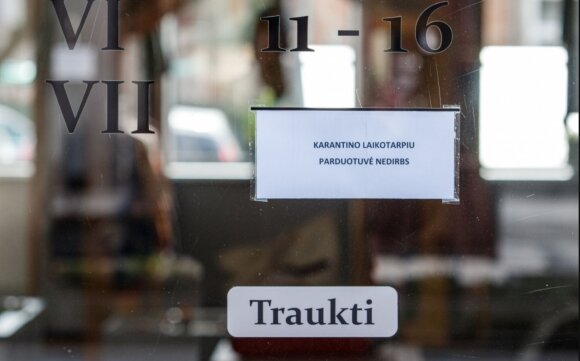
[ad_1]
The government has allowed small convenience stores with entry from abroad to operate as of Monday. Later, some of the larger stores decided to open a small retail space. The answer was that stores cannot be opened in parts.
The lawyers do not agree with that.
“Neither the specified governmental Resolution nor other legal acts provide additional restrictions on how the commercial space will be installed, separated from other premises (warehouses, administrative or others). Therefore, from a legal point of view, there is no reason to prohibit the activities of stores that do not provide more than 300 m2 of commercial space and have a separate entrance for customers ”, says Laurynas Lukošiūnas, partner of the law firm Sorainen.
He explains that the government resolution changes the restrictions on activities due to the pandemic, but the current resolution stipulates that the operating ban does not apply to stores with a sales area that does not exceed 300 m2. meters. This area includes the area of commercial rooms for customer service and goods stowage, as well as measuring booths. However, the area of administrative premises, warehouses and auxiliary premises, workshops, stairs and sanitary premises is not included. Specific stores can operate if they have direct access from the field to customers or a separate entrance used only by customers of that store.
According to lawyer L. Lukošiūnas, the legal acts do not establish the obligation to separate the respective commercial area from other premises by masonry, plasterboard or other special means. Eligible measures must be those that separate the sales area and ensure compliance with the requirements for that area.

Laurynas Lukošiūnas
© Personal archive
“It is not possible to interpret a legal norm in such a way that it denies its essence or creates a new rule, which is not foreseen in the legal norm itself,” said L. Lukošiūnas.
The lawyer ensures that the statements of the individual institutions interpret the restrictions more strictly, this is not established anywhere. This creates an uneven playing field for merchants and raises questions about how to ensure fair competition. According to L. Lukošiūnas, some business entities are in a clearly unequal position, although the range of products can completely overlap, eg grocery stores, which do not have unlimited space.
“Importantly, from a public health point of view, there is no evidence that segregation of the sales area from a larger total area poses an increased risk due to the spread of the COVID-19 virus. If the walls partitions are not “blind”, the air circulation takes place even at more than 300 m2 meters of commercial surface, which should not be considered a negative factor. It is to be expected that the authorities and officials who supervise the application of the clauses of prohibitions adopted act strictly in accordance with the law and do not take disproportionate and illegal actions, which may result in the State having to compensate the damage later. ”says lawyer L. Lukošiūnas.

© Photo by R. Tenio
Magnusson lacks logic
Magnusson’s associate attorney, Edmundas Daunys, lacks the logic of the decision.
“A resolution passed by the government allowing the resumption of operations for stores with a sales area not exceeding 300 m2. Created an unprecedented situation. Supermarkets with a larger area reduced it to a specific size, to which the authorities responded by saying that such behavior was illegal. The lawyers, in turn, are criticizing the drafters of the ruling, calling the document controversial and opening the door to interpretations, “the comment sent surprises.
Anot. E. Daunis, the resolution adopted by the government is not clear, which is reflected in the reactions and public discussions, but is more concerned about the uneven conditions of competition that are being created. m, as some traders have done, adapting to quarantine conditions. In theory, a company would have the right to do so, but it is prohibited. We have a resolution whose logic is not clear, we have the opinions of the individual authorities and we have the reaction of the traders. It is impossible to solve everything in such a way that everyone is satisfied, but in this particular case, the inequality of the ruling is the eye of hunger ”, says the lawyer.

© Magnusson
E. Daunys lacks an argument as to why such practices are prohibited, the insurance logic is unclear.
“The sanctions for which sanctions are foreseen must be very precise, everyone must understand how not to do what is required. Perhaps the government understands the ban, but the sentence is not addressed to them, but in this case to the stores for which its logic is clearly not clear. So the business does not understand why one decision or another has been made, and there are interpretations of several paths: if it is a kind of push by large supermarkets, or of allowing small ones to “recover” in less competitive conditions and so on. on, ”Daunys explains.
To avoid misinterpretation, I would suggest that the Government clarify the resolution by defining the area specified in the property documents and that it cannot be artificially reduced, but such clarifications would also not answer the “why” question.
“If the store, after temporarily reducing the commercial space, guarantees a separate access from the outside and regulates the flows according to the established procedure, then how does it differ from 290 m2? M. Shops in the area? Really nothing Only the first can work, and the second has permission to do so ”, considers the lawyer.
It points out that the Competition Council also pointed out that the imposition of restrictions on economic activity should not confer advantages on some companies by discriminating against others, since in the long term this could lead to changes in the market power that consumers would feel.
The lawyer also sees a violation of one of the principles of public administration, proportionality, in the restrictions on commercial space.
It is strictly prohibited to use the information published by DELFI on other websites, in the media or elsewhere, or to distribute our material in any way without consent, and if consent has been obtained, it is necessary to indicate DELFI as the source.
[ad_2]